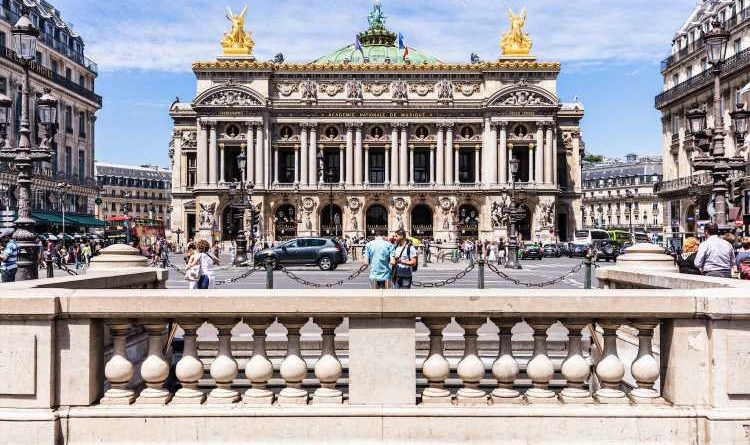France Is Reopening to Travelers—Here’s Everything You Need to Know
© Photo by Shutterstock
France Is Reopening to Travelers—Here’s Everything You Need to Know
Photo by Shutterstock Is Paris ready for us?
Load Error
Is France ready to welcome visitors?
Honestly? It doesn’t feel like it on the ground here, at least not yet. There was a meme going around when French President Emmanuel Macron announced he’d be reopening the country—something akin to, “Nice, but news to those of us still in lockdown!” In April, when Macron first signaled his intentions to reopen for travel, the country itself was still very much closed. Museums were closed, and restaurants and cafés were closed both for indoor and outdoor dining. French residents weren’t able to travel within their own country, and a curfew was in place. It was hard to imagine hosting visitors with the lack of things to actually do, not to mention with the high daily case counts (France was in the midst of a second wave of COVID-19 cases in April, peaking at more than 40,000 cases per day, which are thankfully now steadily decreasing) and a slow vaccine rollout (only 17 percent of the population has thus far been vaccinated, according to Reuters).
That said, the government has since announced a phased reopening schedule. This week, the 10-kilometer (or 6-mile) limit on movement that had been placed on residents has been lifted, allowing people to travel more freely around the country, and on May 19, the curfew will move to 9 p.m. (up from 7 p.m.). Restaurants and bars will be allowed to serve outdoors again with up to six people per table. Cultural institutions, such as the Louvre and other museums, will also reopen with a capacity of up to 800 people indoors and 1,000 outdoors. Two weeks after that, in addition to allowing foreign tourists to enter the country, restaurants and cafés will be able to seat diners inside, fitness centers will be allowed to reopen, and the curfew will be moved to 11 p.m.
Come June 30, there will be no restrictions on the number of people gathering indoors, but nightclubs will remain closed. Of course, all of this is subject to change at any moment if “the incidence rate again exceeds 400 infections per 100,000 inhabitants; a sudden increase in this rate; or a threat of saturation of intensive care services,” Macron cautioned.
Those who work in the tourism and restaurant industries, however, are ready to welcome visitors with open arms. “Are we ready?” says David Mebane, founder and CEO of the Austin-based Fat Tire Tours, a bicycle tour company with hubs in eight foreign cities, including Paris. “Desperately ready. We’ve been ready. Champing at the bit. I don’t know what other idioms I can come up with. We are so looking forward to getting back to what we do best; having fun and showing people around the European cities we love.”
Mebane feels generally lucky that his business is centered around being outside and naturally socially distant: “You can’t ride closer than three feet from someone,” he says.
June Chin-Ramsey, CEO of private and small group tour provider Context, is equally enthusiastic about welcoming travelers to France again and at the moment is only offering private tours: “We understand that as our world emerges from a year in lockdown, there will be varying levels of comfort when it comes to getting back on a plane or setting foot in a different country,” says Chin-Ramsey. “It’s important to us that we find ways to meet each of our customers where they are at.”
What is France like these days? How has the pandemic changed things there?
It’s been rather bleak in France these last five months—particularly in Paris. Locals are over the constant back and forth regarding restrictions (changing curfew times, schools closing then opening then closing again, etcetera) and are ready to move on. Out and about, few people are truly abiding by the social distancing rules (which is three feet in France, versus the six feet recommended by U.S. public health officials). While masks are still required everywhere—even outside—they’re often worn haphazardly (such as below the nose or dangling from an ear). We are all trés fatigué and many have major envy of the more speedy vaccine rollouts in other countries, such as the U.S. and the U.K. That said, everyone is still going about their business and doing what they need to do to get through. As we say here, “métro, bulot, dodo,” or commute, work, sleep. When it’s nice out, people are definitely congregating in parks or by the river like Before Times.
© Photo by Sara Lieberman
After a challenging start to 2021, French residents are getting outside more this spring.
Photo by Sara Lieberman After a challenging start to 2021, French residents are getting outside more this spring.
As for the future, people are definitely starting to feel hopeful for a more “normal” summer ahead as the vaccine rollout continues, and it does feel like there is starting to be a light at the end of the tunnel. Each day, I hear from yet another friend who has gotten their first dose of a COVID-19 vaccine, which is making things feel increasingly positive. One French friend says she’s in full-on “revenge travel” mode, and has already booked trips to Portugal, Croatia, Greece, and Italy for summer.
Requirements for traveling to France
Until June 9, France remains closed to any foreign nationals who don’t have a residence permit or a valid reason (which includes a medical reason, traveling for work purposes, or visiting a sick relative) with proper documentation. Those who do must also show proof of a negative COVID-19 polymerase chain reaction (PCR) test taken 72 hours or less prior to their outbound flight and must self-isolate for seven days after arrival.
Starting on June 9, non-nationals (including Americans) will be allowed entry given they present the Pass Sanitaire, or digital health pass (it is still not clear exactly how this digital health pass will work and if a paper certificate is likely to be accepted as well), that shows proof of vaccination and have tested negative for COVID-19.
When in France, masks are still required in all public places, even for those who are vaccinated (except when running or cycling), and gatherings of more than six people are forbidden. Alcohol consumption in public remains banned (prior to the pandemic there was no such ban).
Requirements for returning to the United States
All international arrivals to the United States—including returning U.S. citizens—must provide proof of a laboratory-generated negative COVID-19 test result procured no more than three days prior to departure to the U.S. There is currently no exception for those who have been vaccinated for COVID-19.
Getting a test is pretty easy all over Paris and appointments aren’t usually required, depending on the site, though you can make one using the Doctolib app. Tests are free regardless of your nationality or whether you have insurance, and results often take less than 24 hours. Though, when choosing your testing site be sure to specify it’s for a PCR test (not a rapid antigen test) and that results are guaranteed in 24 to 36 hours.
What airlines have flights to France right now?
Several airlines are operating flights from various U.S. cities including Delta, Air France, American, Lufthansa, Finn Air, Iberia, United, Swiss, and TAP Portugal—what’s more, the rates are pretty good, starting at about $550 round-trip for both nonstop and connecting flights to Paris.
Where to stay in France
© Courtesy of Loire Valley Lodges
Visit France’s renowned châteaux region while relaxing in nature at the new Loire Valley Lodges.
Courtesy of Loire Valley Lodges Visit France’s renowned châteaux region while relaxing in nature at the new Loire Valley Lodges.
The pandemic didn’t prevent several new hotels from opening up in Paris and elsewhere in France. In the capital, film fans and anyone who’s missed the cinema might want to check into Hotel Paradiso. Each room is outfitted with its own projection screen with hundreds of movies to watch from the privacy of your bed—Twizzlers included. Over near the market street Rue Montorgueil and the popular food-driven block Rue du Nil in the Second arrondissement, the Hotel du Sentier is a lovely choice for a sunlit, contemporary styled stay behind an old Egyptian facade. For those seeking a wellness-focused property, Hoy Paris recently opened on the trendy Ninth arrondissement street Rue des Martyrs. TVs are swapped for ballet bars in some of the 22 rooms, and guests have access to yoga mats as well as carafes of water purified with Japanese binchotan charcoal.
In the rest of the country, Loire Valley Lodges, which opened last July, is an excellent place to remain socially distant in a chic tree house not far from the region’s famed châteaux. The hottest address in Marseille is Tuba Club, with only five cabanas to spare for overnight stays, but the coolest rocks to sunbathe on in the south. Speaking of rocks, Hotel les Roches Rouges remains the place French Riviera dreams are made of, while the soon-to-open Souki Lodges and Spa at the foot of stunning Pic de Vissou mountain in Provence’s wine region offers ecofriendly vibes amidst nature. Further to the west, and closer to the coast just north of Biarritz, the 33-room stunner 70 Hectares and the Ocean from the family behind luxury Provence property Domaine de Fontenille opens in June.
>> Next: 6 Overlooked but Superb French Wine Regions Worth Exploring
Source: Read Full Article




